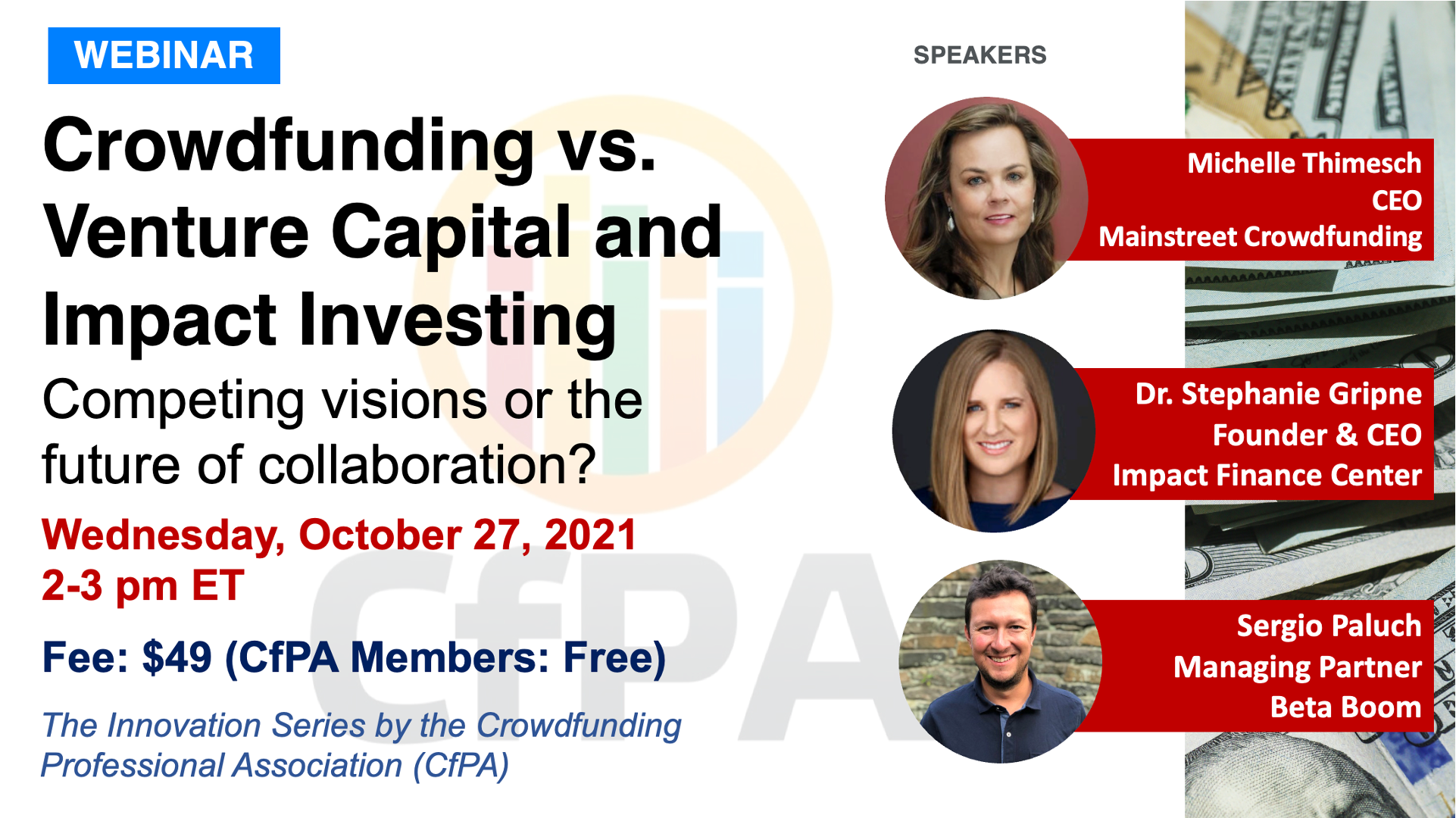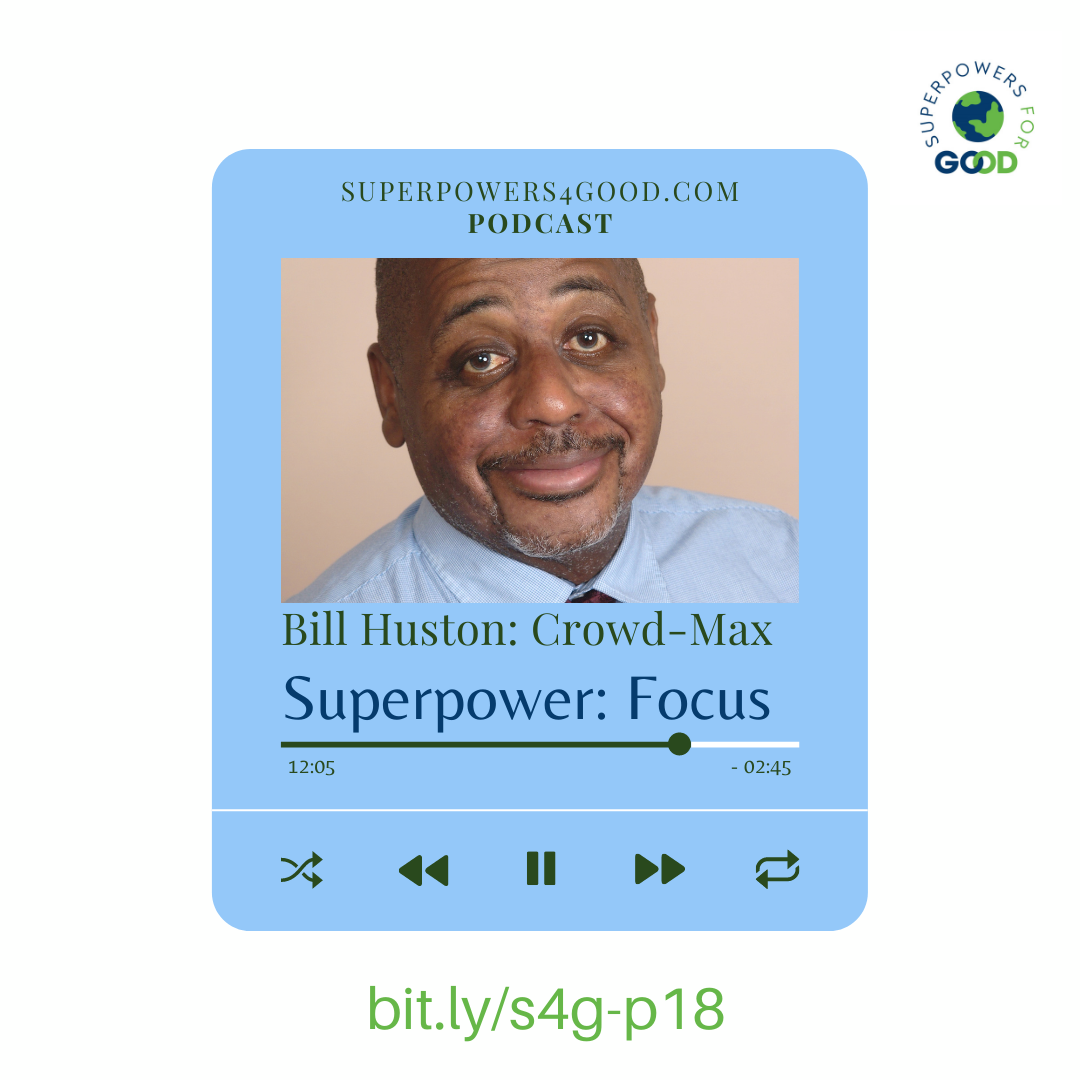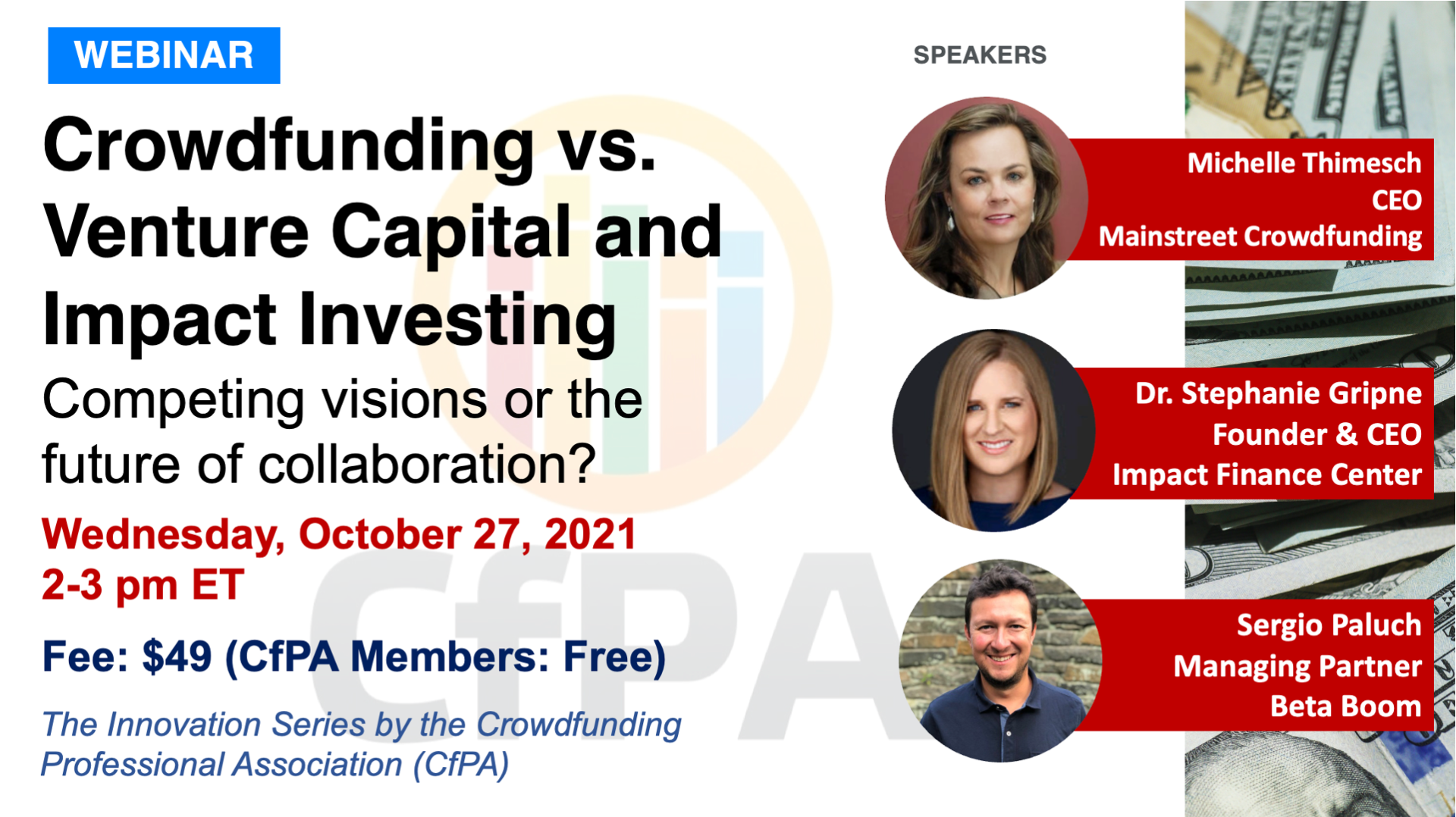Crowdfunding ECO Town Hall Ask to Join
Register and request to join to see more.

2021 Year-End Letter from CfPA’s Chairman, Scott McIntyre
Dear friends,
Thank you for another year far surpassing my hopes both personally and professionally. The CfPA continues to be highly-regarded here and abroad as a generous and vital organization expanding access to capital and opportunity for entrepreneurs, small businesses and investors. Our work in 2021 helped Crowdfunding reach new highs, extended our global voice, and expanded our capacity domestically. We saw over $500M raised using RegCF offerings where even non-accredited investors finally got a piece of the pie. We saw RegA+ offerings land over $2B. For these, and so many other reasons, it continues to be an honor to be a part of a leadership team on the cutting edge of Alternative Finance. CfPA’s reputation continues to be enhanced by the many professionals who freely contribute their time and expertise to advancing the association and the industry. There have been so many noteworthy moments and I look forward to seeing even more debut in ’22.
In 2021 I learned that a Chair’s best use is more about counseling, enabling and facilitating a board of volunteer directors. After 8 years of sometimes cloudy, frenetic, reactionary executive responsibility on the board as President/Chair, VP and Secretary, this year continued to reinforce that Restraint, Patience and Availability were most beneficial to the organization’s productivity. In a year we were all forced yet again to practice patience, discipline and resilience, the necessity of productive group discussion has only grown more valuable and at the same time more challenging as our members and our leadership faced similar disruptions in their paid professions. Luckily, our board again carried this responsibility diligently, as we added a great number goals and projects to our calendar, including the requisite planning sessions, expert discussions and public forums many of which were recorded to our growing video archive.
As we took account of our annual performance, we all agreed there remains plenty of room for improvement. As most boards only meet a few times per year, ours meets monthly, plus a monthly executive committee meeting, plus monthly committee meetings, plus numerous events, conferences and other gatherings. To accommodate this packed calendar, a number of improvements will begin in January, including a crop of new directors and more active committees. In addition, I will meet more frequently with all our board members individually to ensure their voices and priorities are incorporated into our evolving agenda. All of these changes should make our frequent meetings and demanding mission less prospective and more productive.
To that, our President, Samson Williams has provided me with a short list of what to expect from us in ’22. He asks for your continued support of the CfPA as members, as sponsors, as volunteers on our many projects, or even just as fans willing to share the news of how Crowdfunding has so rapidly become the go-to funding option for founders and business owners. Samson kindly thanks the funding portal operators, marketers, educators, investors and all champions of change, citing that together we make Main Street a healthier, more innovative marketplace for Startups and Entrepreneurs while making the funds they receive more transparent, accountable and meaningful to the investors trusting them.
On the slate for 2022:
Crowdfunding Professional Certification — Crowdfunding will continue to be a multi-billion dollar industry (est. $8-$12B annually by 2026). Investors and entrepreneurs deserve to trust that certified credentials underpin the distinction of “Crowdfunding Professional”. We have several developments underway, all including education and exams, to facilitate that such certification is broadly recognized and valuable.
Technical Seminars — We surveyed funding portals, investors and issuers, and THE single biggest challenge facing them all is finding impartial, accurate, trustworthy technical assistance to demystify the Crowdfunding process. Need to know the nuts and bolts of the JOBS Act and Crowdfunding? Stay tuned as we launch our monthly technical seminars.
Your voice on The Hill, and at the table — From advocating to raise individual investor limits to providing paths for more non-accredited investors to qualify for equity investments to raising campaign limits from $1M to $5M, the CfPA will continue to advocate for the changes that make Crowdfunding easier and more equitable for Founders, Investors and Funding Portal Operators. Join us and let us know what pain points you need us to help fix on your behalf in DC and beyond.
Samson closed off with “Entrepreneurship is so hard I generally only recommend it to my enemies and dreamers. Keep dreaming. I believe in you.”
For their tireless energy, bottomless optimism and genuine commitment, I thank, sincerely, our President Samson Williams, our VP Devin Thorpe, our Treasurer Brian Belley and our Secretary Peter Rostovsky, and all our selfless volunteer leaders serving on both the board and on committees. Ultimately, I am responsible for helping everyone on the board be the best director they can be, and while I can hardly take credit for this year’s remarkable performance despite all odds, I continue to be humbled being entrusted to chair this remarkable organization—I feel similarly when friends complement my son’s warm disposition assuming I must be a great parent—he’s just a good kid…and I’m pretty lucky there too.
Thank you all for another fulfilling year supporting equitability and prosperity for all. Sincerest regards, and to a bountiful, restorative year ahead,
Scott E. McIntyre
Chairman
CfPA Board of Director

Reg CF: Investment Crowdfunding Tops $1.1 Billion in 2021, Predicted to Double in 2022
Nice headline to end the year ...
Crowdfund Capital Advisors (CCA), a research and advisory group tracking online capital formation under Regulation Crowdfunding (Reg CF) in the US, is reporting that since the industry launched over $1.1 billion has been invested for firms issuing securities under the exemption.
Some other highlights from the article:
CCA shared some of the headline data points for Reg CF, including:
- Investments into startups and small businesses up 140% over 2020, shattering last year’s record, exceeding the projection of $500 million invested, and leading CCA’s Online Investment Index to record highs.
- Total financing in 2021 exceeds all investments from 2016 through 2020.
- More than 540,000 investors participated in over 1,500 offerings. More than 2019 and 2020 combined.
- The average raise across the industry is an all-time high of $450,000 from a low of $200,000 in 2018 as the number of jobs supported/created among these issuers reaches 100,000.
- In March, SEC updated the maximum issuers can raise from $1 million to $5 million, the industry then surpasses $1B in funded capital in October.
- Follow-on crowdfunding rounds were raised by over 500 issuers.
- The market value of crowdfunded companies jumped to $33 billion as median valuations hit record highs.
- 68.4% of offerings were successful and closed within 8 months, which is higher and faster than “traditional” VC round timelines. The average closing time tightened in 2021 to 7 months.
- VCs & Y-Combinators jump into the space both co-investing and syndicating offerings providing further validation.
- The number of $1 million+ offerings hit record highs with several $5 milllion+ rounds proving Reg CF a viable “Silicon Valley-sized Seed round.”
Issuers used 43 intermediaries to raise crowdfunding facilitated capital, up 10% over 2020. Wefunder, StartEngine, Republic, and SeedInvest, accounted for over 80% of all the funding.
Happy New Year everyone!

Crowdfunding Could Be a Key Part of Closing the Wealth Gap Between African Americans and the Larger Community
Bill Huston, founder and CEO of Crowd Max Publishing, advocates for crowdfunding as a wealth-building tool for African American and other underserved communities. He also consults with entrepreneurs and real estate developers in the communities he serves to help them access capital via crowdfunding.
That Black communities are not getting their fair share of capital from traditional sources is a well-established fact. Bill describes the data as “clear and consistent.” African American women get less than 1 percent of venture capital. And it isn’t just venture capital that isn’t allocated to Black-owned businesses. Only 4 percent of SBA loans (bank loans guaranteed by the Federal Small Business Administration) go to Black entrepreneurs. Less than 2 percent of PPP funding during the pandemic went to Black-owned businesses.
Bill acknowledges that many businesses in the African American community don’t qualify for these traditional sources of capital. He notes that because of a vast wealth gap between the community and the rest of America, Black entrepreneurs can’t raise as much money in a friends-and-family round—typically the first round of funding for a startup. As a result, such businesses are less likely to meet the requirements of traditional formal capital.

Webinar: Wednesday October 27, 2021: 2-3 pm ET: Crowdfunding vs. Venture Capital and Impact Investing
Webinar: Wednesday October 27, 2021: 2-3 pm ET
This is a public event hosted by the Crowdfunding Professional Association. Members may attend free.
Moderator: Devin Thorpe, Author, VP, Crowdfunding Professional Association (CfPA)
Overview: Sherwood Neiss - Crowdfund Capital Advisors (on VC funding vs Crowdfunding for under-represented groups)
SPEAKERS:
Michelle Thimesch, CEO, Crowdfund Mainstreet (Confirmed)
Dr. Stephanie Gripne,Founder & CEO, Impact Finance Center (Confirmed)
Sergio Paluch, Managing Partner, Beta Boom (Confirmed)

Save the date: Webinar: 10/27 - 2 PM ET: Crowdfunding vs Venture Capital in Impact Investing
** SAVE THE DATE **
Please save the date for CfPA next webinar on Crowdfunding vs Venture Capital in Impact Investing. We have great speakers lined up.
Moderator: Devin Thorpe, Author, VP, Crowdfunding Professional Association (CfPA)
Overview: Sherwood Neiss - Crowdfund Capital Advisors (on VC funding vs Crowdfunding for under-represented groups)
SPEAKERS:
Michelle Thimesch, CEO, Crowdfund Mainstreet (Confirmed)
Dr. Stephanie Gripne, Founder & CEO, Impact Finance Center (Confirmed)
Sergio Paluch, Managing Partner, Beta Boom (Confirmed)
REGISTRATION INFORMATION COMING SOON ....



